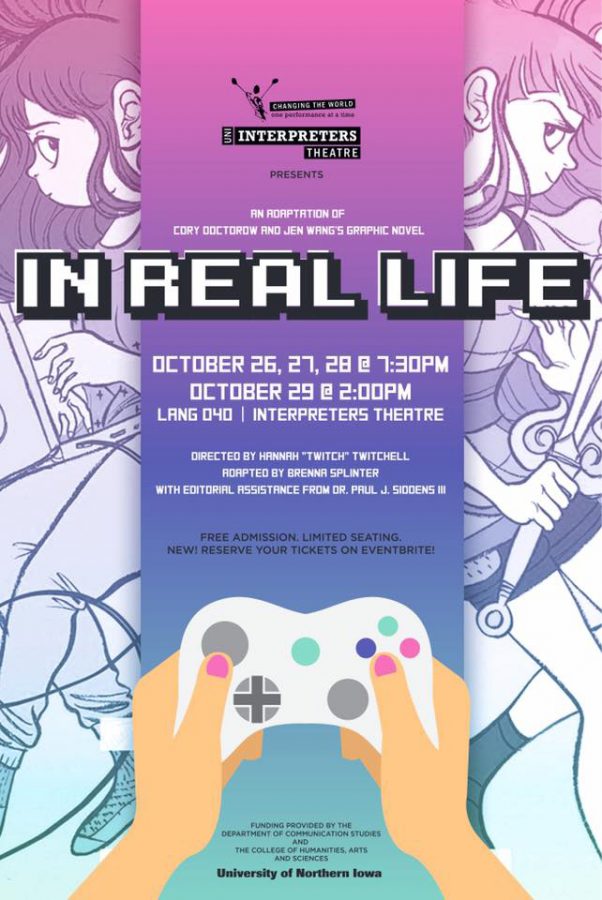A charming performance ‘In Real Life’
COURTESY PHOTO/Interpreters Theatre
UNI’s Interpreters Theatre put on the first theater adaption of Jen Wang and Cory Doctorow’s award winning graphic novel, “In Real Life,” on Thursday, Oct. 26 at 7:30 p.m. Subsequent performances took place throughout the weekend.
Oct 30, 2017
Sometimes it seems almost too easy to slip into a virtual gaming world and forget about real life. However, there are still consequences for actions in both worlds. In director Hannah Twitchell’s play based on the graphic novel by Jen Wang and Cory Doctorow, we see how balancing reality and a virtual world can sometimes become a challenge.
The live adaption of Wang’s novel was performed on four evenings at UNI’s Interpreters Theater in Lang Hall, with the opening performance on Oct. 26. The two-act play was directed by Twitchell, a theater performance major at UNI. Brenna Splinter, an English teaching major, adapted the play from novelist and cartoonist Jen Wang’s book “In Real Life.” Wang gave a talkback session after each performance.
While “In Real Life” appeared to be directed more towards a young adult or teenage audience, adults who attended were able to enjoy the performance as well. Each character in the performance had their own unique personality, which helped to connect the audience to the story.
Throughout the story, we follow a young girl named Anda, portrayed by UNI sophomore Alexa Lloyd, as she experiences conflict in both her real life and in her avatar’s online world. The play briefly tapped into some current issues in society, such as risks of putting out personal information online.
While the production was filled with tense scenes and sword fights, comic relief came in the form of Anda’s mother, played by UNI junior Brittany Starr, and the avatars of players who were unexperienced with video games. The mother’s sarcastic remarks and the online avatars of players who did not know how to work the remote controller drew laughter from the audience. The actresses who played the inexperienced players’ avatars did an excellent job of showing what it’s like to play a new online game. The girls would get ‘stuck’ in a corner of the game, jump repeatedly in the wrong directions or swing their swords into thin air.
The play evoked a heartwarming feeling during the scenes in which Anda connected with a boy from China through the virtual world. However, the scene also created awkward tension when the topic of child labor laws was brought up.
Ah Duo, played by Tait Larson, served as the voice of reason in the play and made references to the stereotype that Americans think that they are responsible for helping the rest of the world whether they like it or not. In some scenes, Ah Duo even refers to Anda as the ‘little American girl’ in a negative way. While it created discomfort with some audience members, it definitely addressed the rigidity of relationships between the United States and foreign countries.
The dialogue was overall pleasing to listen to and mostly realistic. It was at its weakest during the scenes at school when Anda’s friends were scrutinizing a fellow student for wanting to start a board game club. The characters’ derogatory statements about board games were hard to imagine happening in real life.
In addition to the dialogue, the sword fighting scenes were another area where work could have been done to improve the fluidity of the character’s movements. It was unclear whether or not the stiff and jerky movements of the avatars was intentional, but either way it made the fight scenes less realistic.
The costumes, lighting and casting choices were all successful for the performance. The pastel colored backdrop helped to draw the audience into the virtual world in whichAnda was playing. Each outfit for the online characters was eye-catching and reflected the vibrancy of outfits used in today’s video games.
Overall, the play was a charming, heartwarming story featuring a modern-day setting that reaches out to young gamers. The play also sent a powerful message about the strength of female gamers in an originally male-dominated environment.
“In Real Life” is part of the Hearst Lecture Series at UNI. The next event will be a lecture by Tim Dodd on Nov. 7, at 6 p.m. in the Rod Library Scholarspace.









Brenna Splinter • Nov 1, 2017 at 11:09 am
Thank you so much for the great review. I would like to clarify though that the script was adapted from the graphic novel by me, Brenna Splinter. With editorial assistance from Hannah Twitchell and Dr. Paul Siddens.